#useful data on ebooks
Explore tagged Tumblr posts
Text

YES PLEASE USE NEWPIPE its so good you can download video+audio in a ton of different formats or just audio as m4a, and then you can use video transcoder from fdroid or github to change the codec to whatever you want. It is so genuinely amazing and doubles as an alternative youtube client AND it has no ads
One thing I really love about seedy anime websites and YouTube mp3 converters is like. They actually do what they say they’re doing. But they WILL try to trick you into downloading a virus. Like it’s almost just a greeting at this point. I try to extract a song from a YouTube video and it says free VPN installer tonight perhaps? Free VPN installer tonight queen? And I say YouTube-mp3 converter you sly dog, you know what I’m here for. Show me the goods. And YouTube-mp3 converter says ahhh you got me, no getting one over on you. Thought it was worth a try tho. Here you go king x
#also just in general for android fdroid is such a good alternative appstore because of the sheer volume of foss apps on there#mindustry is on there#a ton of great musiv streaming apps and mp3 players#loads of privacy/networking stuff#librerafd ebook reader#utility apps#some great alternatice navigation apps like luftlinie and organic maps#phypox is great for running tests or gathering data with your phones built in sensors#for example you can use it to find barometric pressure in your area if you need to predict the weather#or if you wanna impress people by telling them itll rain and being correct#ive got smart autoclicker from there to automate queued posts so i can spam those on mobile#chipdefense is a great mildly involved/casual tower defense#as is anuto td#theres a ton of apps on there focused on being as lightweight and small as possible too if space is a concern for you
170K notes
·
View notes
Note
:) hi DD! Hope you're well. Have you seen this?
www.theatlantic.com/technology/archive/2025/03/search-libgen-data-set/682094/
Search turns up 186 entries for Diane Duane.
I’ve seen it, yeah.
As far as I can tell, just about every book I’ve ever written got used to help train their nasty wasteful idiotic garbage-spouting machinery. Some of my novels were used several times in different formats, or multiple languages. A significant portion of them were obtained from our own little ebook store (because they’re not sold anywhere else).
I am…
(gropes for words)
…For the moment let’s just put it as gently as possible and say “Not Amused.”
And I intend to make sure that the next book of mine that comes out is wearing a cover sticker that says NEW! NOT STOLEN BY META!
…Anyway, thanks for asking.
221 notes
·
View notes
Text
I have no idea why this needs to be said, but you can hate generative AI, love the Public Domain, love media preservation, hate the overbearing US Copyright system, and... still believe that Copyright Laws exist in the first place for a reason, (even if, thanks to Big Corporation Monopolies, it's been twisted into its current behemoth monstrosity.)
You can hate Large Language Models and still believe in Copyright Reform over Copyright Abolishment.
You can believe in Media Preservation and still believe that Plagiarism is wrong.
You can hate the current restrictive Copyright Laws without wanting to abolish them entirely.
You can love the Public Domain and still loath predatory corporations stealing everything they can get their hands on, to literally *feed the machine.*
These things are not mutually exclusive, and if you think that
"you can't hate AI if you hate the current copyright laws"
or that
"Hating on Generative AI will only give us more restrictive copyright and IP laws, therefore you need to normalize and accept generative AI stealing all of your creations and every single thing you've ever said on the internet!"
I just genuinely don't understand how you can say this kind of crap if you've ever interacted with any creative person in your life.
I'm a wanna-be-author.
I want as many people to be able to afford my written works as possible without restrictions, and I fully plan on having free ebooks of my works available for those who can't afford to buy them.
*That does *not* mean I, in any way shape or form, would ever consent to people stealing my work and uploading it into a Large Language Model and telling it to spit out fifty unauthorized sequels that are then sold for cash profit!*
You cannot support generative AI and turn around and try to claim you're actually just defending small time artists, and *also* you think no one should have any legal protections at all protecting their work from plagiarism at all.
Supporting unethical generative AI (which is literally all of them currently), protecting artists, and *completely abolishing* copyright and intellectual property laws instead of reforming them *are* mutually exclusive concepts.
You *cannot* worship the plagiarism machine, claim to care about small artists, and then say that those same small artists should have absolutely *zero* legal protections to stop their work being plagiarized.
The only way AI could even begin to approach being ethical would be if using it to begin with wasn't a huge hazard to the enviornment, and if it was trained *exclusively * on Public Domain works that had to be checked and confirmed by multiple real human beings before it was put into the training data.
And oh, would you look at that?
Every single AI model is currently just sucking up the entire fucking goddamn internet and everything ever posted on it and everything ever downloaded from it with no way to really truly opt out of it or even just to know if your work has been fed to the machine until an entire page of text from your book pops out when it generates text from someone's writing prompt.
And no, it's not just "privileged Western authors" who are being exploited by AI.
For an updating list of global legal cases again AI tech giants, see this link here to stay up to date as cases develop:
#large text#long post#anti ai#fuck ai#not writing#copyright reform#copyright law#intellectual property
119 notes
·
View notes
Text
I think the thing that makes me most furious about Tumblr selling data to AI and Findaway/Spotify only stepping away from doing that when people got mad isn't, like, the one or two sketches I've made and posted over the years - good luck training your AI on the work of me, person who got a C in GCSE Art
It's the art/narration that I hired an artist/narrator to make with the agreement that it would be used as an ebook cover/audiobook and for related marketing purposes
And then the places I used for those things change the TOS and take their work to train AI
Like, plenty of authors are now in the position of having posted book covers or commissioned art of their characters to Tumblr, and the artists they hired are now being screwed over by this, without even needing to have ever interacted with Tumblr before
210 notes
·
View notes
Note
I’m definitely interested in what you read/listened to for that specific character that was into radio in the 1920s!
ah, of course i got asked about the one i have the most material to link.
So I'm just gonna dump a bunch of links/titles without elaborating on them much or else we'll be here all day lmao. here's literally every research material I've got that's related to radio: websites, books, & old time radio recordings. There's 23 links/books here.
Websites:
Radio Drama Sound Effects - History, How-To, Photos, Clips, Tutorials
birth of FM Radio
antique radio smell
Indianapolis Times RADIO SECTION (Jan 8 1925) - overview of the first year of radio. subsequent issues of the Indianapolis Times also have radio sections.
brief radio history / Smithsonian Education
Radio Broadcast magazine issues 1922-1930
Manual of Occupations 1929 (incl. job descriptions & salaries)
Radiotelephone procedure US Army Air Force 1943 - I couldn't find something similar for WWI so I just figured it was a more rudimentary form of this.
Radio Sunglasses - Spectacles RE-103 Radio Ross Electronics - i know it's from the 60s but isn't it great. more importantly: this website is an online museum of vintage radios
The Coutant Microphone Site - pictures, recordings, and data on old microphones. a bit overwhelming unless you already know what kind of microphone you want info on; if you do, it's incredible valuable.
Books:
Making Radio by Shawn VanCour - THE most important scholarly book about the first years of the radio broadcast industry: covers everything from scheduling to technology to advertising to legislature to actual programming. COMPLETELY focused on the 1920s.
Lost Sound: the Forgotten Art of Radio Storytelling by Jeff Porter - covers everything from early radio up through podcasts, lists a LOT of radio dramas worth listening to.
The Big Broadcast, 1920-1950 by Frank Buxton and Bill Owen - I didn't actually get around to reading this one before my hyperfixation shifted but I have it in my ebooks
Radio Production by Robert McLeish - same thing lmao
archives of Old Time Radio (OTR) programs.
Most of these only reach back to the 1930s at the earliest, but that's because (as Making Radio explains) VERY few programs from the 20s were preserved to today. You simply Will Not find programs from the 20s. Your best bet to get a picture of 1920s radio broadcasts is to read Making Radio
A Little Bit Of Everything - youtube; single episode from 1928. In the 1920s there was a popular genre of radio program called "atmospheric continuity," which was 50% musical performances, 50% a very thin story to connect the musical performances (for example, a bunch of songs about flowers, and in between them a plot about a guy walking through his flower garden). By the 1930s, this genre was DEAD. So few recordings of 1920s radio broadcasts were preserved that this recording—an atmospheric continuity show about making an atomspheric continuity show—is the ONLY recording of the genre I've ever found.
The1920sChannel - youtube; uploaded the video above. An eclectic mix of videos on 1920s culture & events; some of them are about radio.
Columbia Workshop - archive.org; a radio program. god this one's SO important, several of the early episodes educate the audience about how radio & radio programming works and do experiments with the art of radio storytelling that sets precedents for radio dramas henceforth (Lost Sound goes into Columbia Workshop's influence in depth).
jfyuga - the uploader of Columbia Workshop has a bunch of other OTR programs available too.
The Radio Ghost - youtube; reposts OTR episodes
Old Time Radio Archive - youtube; reposts OTR episodes
Chesterton Radio - youtube. unfortunately their playlists are so specific (a bunch of one-video playlists sorted by individual performers, for instance) that it's hard to scroll through them to find specific shows.
David Von Pein's Old-Time Radio Channel youtube; reposts OTR episodes
Quarantine Radio Theater - youtube. modern performances of old radio programs; they've done reproductions of some stuff I wasn't able to find the original recording for
Old Is Best - youtube. lot of sampler/compilation videos, mostly news/nonfiction; has some of the few recordings from the 1920s available. also has some oddities like blooper compilations.
And my final bit of advice: PODCASTS.
go to whatever podcast website/app you like best. doesn't matter which one. Search for "otr" or "old time radio." There are DOZENS of podcasts that are JUST uploads of old radio programs—sometimes they'll rebroadcast entire series, sometimes they'll sample individual episodes from a bunch of different series. they're usually divided up by genre. I like the horror & suspense OTR podcasts personally.
23 notes
·
View notes
Text
Mathilda reminding us it is 2007 and we are at war is so funny. Like eye know its 2007 but sometimes nora will be like “sent a thumbs up emoji” or “held down a message to react to it” and i’m like you couldn’t do that in 2007. I think jeremy also scrolls on his phone for news. And that wasn’t impossible and he is mister richy rich so i’m sure his family shells out for data or whatever but!! Just some small anachronisms!!! But this is not a complaint i do mostly think of these books as kinda pjo esque where they take place just from the early 2000s to now and its fine!! Also like i only have to pay 99 cents for the ebooks nora could have the ravens pull up in cybertrucks and i would just giggle and be like moving on!!! As long as the story is good and driving me batshit i do not care that much about the accuracy of phone technology
#aftg#tgr#the golden raven#i will not tag nora but if she sees this know this is not a complaint i love this actually!!#also nora let me give you more money i have reread the og trilogy seven times#i also think that the foxes should have been calling the ravens emos as a form of bullying because that was an insult in 2006
25 notes
·
View notes
Note
Since you've mentioned that you use Scrivener as a word processing software, I have a bit of a weird-ish question. I have looked at the programme and it seems incredibly useful, and then I looked at the pricetag and- gulp.
I currently use Word which costs 5 euros per year thanks to university, but am thinking about switching to another programme that isn't related to my uni as I feel too paranoid about my smutty fanfic ideas being looked at by my uni and them disapproving of my writing. XD (Word keeps marking "fuck" with a squiggly line and suggesting I choose another word to avoid offending my readers, but if canon doesn't give Barclay some holographic MMF action taking place during "A Fistful of Datas" and turning both his holographic partners into holographic Data and therefore inducing maximum tension and insecurity due to feelings in poor sandwiched Barclay whenever he meets actual Data after that, I will have to write it myself! :P )
According to the website where one can buy a Scrivener license, one pays for the current version of it and will have to buy later versions anew if I haven't misunderstood. You seem to have used it for quite a while, and I haven't managed to find out when the different versions came out. I know the current one is 3, but I am unsure how much time passed between 1 and 2 and 2 and 3, and am unsure whether it's a good idea to buy a license now or whether it would be wiser to wait if it's likely that another version might be released in the near future (that is within one year for example) because then I might wait a little while with my purchase, heh. It probably sounds quite stingy but I am solely getting it for my tiny and too seldom indulged hobby of writing fanfic, and currently have to kinda sorta pay more attention to my wallet and where its contents go, so to say, which is why I'm hesitant.
The question basically is: As a (probable?) long-time user, do you think it's likely a new version of Scrivener will be released within the next year or so or do you think it's likely the current version will be tha latest to purchase for a longer while than 1-2 years?
I hope this rambly mess makes sense, haven't really slept for quite some time, so I am sorry if this is terribly incomprehensible. Sorry for the weird stingy question. Have a nice day and I hope you have slept and will sleep better than I currently do, heh!
--
I've only used it for like three years.
A quick google suggests that Scrivener 2 was released in 2010. 3 was released in 2017 basically to keep up with OS changes.
(IDK what you searched, but this isn't hard to find, dude.)
Scrivener is a fairly... old-fashioned style of software, I guess I'd call it. Some dude wrote himself a program to write his own novel and then people liked it. Some other guy decided to port it to Windows.
They update approximately never. When they do, recent buyers of the old one upgrade for free and everybody else gets like half off. The trial period is 30 days of actual use. The current retail license for 3 is only like sixty bucks. It's a commercial product, but... not like you've been trained to expect by your average modern software that wants to nickle and dime you at every turn.
Do you need Scrivener? Well, no. Not unless you want customizable high-level ebook output formatting and fancy features like that. You could just use some other free option if you just want to type stories in something that isn't Word. But Scrivener is priced extremely low for what it is.
159 notes
·
View notes
Text

NASA has just confirmed something groundbreaking—Voyager 1 and 2 are coming home. After nearly five decades in interstellar space, both spacecraft will begin their return journey using a classified propulsion system secretly integrated into their design.
The plan was hidden from the public and Congress to prevent funding cuts. Ever since Apollo ended, Congress had been scaling back deep-space programs, so NASA kept this as a contingency.


Unlike their outward journey, which used gravity assists to escape the solar system, their return will rely on a gravitational recapture trajectory.
Jupiter and Saturn are perfectly aligned to provide back-to-back slingshots, boosting their speed to 78 km/s, nearly double their original velocity. Combined with high-efficiency ion thrusters, this will allow a rapid approach back toward Earth.


A key factor is the RTG nuclear battery reserve, a secret feature installed at launch. While the public specs listed only 470 watts of power, engineers had quietly included an additional 940-watt thermal energy reserve, intended for a controlled return if needed.
These RTGs will now activate the return thrusters, guiding both probes back into Earth’s gravitational influence.


NASA estimates reentry on 6/31/2037, over the Southern Hemisphere. The recovery plan ensures a controlled descent, preventing any risk of uncontrolled reentry.
Scientists are eager to analyze the spacecraft, which have endured nearly 50 years of deep-space exposure, providing rare data on long-term spaceflight durability.
For decades, Voyager was seen as a one-way mission. But this proves otherwise. The return of Voyager 1 and 2 will mark a historic moment—the first retrieval of an interstellar spacecraft and proof that no mission is truly final.


Follow for daily educational content and check the link in bio for free ebooks on the space shuttle, ISS, Falcon 9, and rocket propellants.
18 notes
·
View notes
Text
Library of the Future (DOS/Data Discman/Windows 3.1/Windows, 1990/1991/1992/1993/1994/1996/1999)
In 1971, a man used a mainframe computer to type a copy of the Declaration of Independence. That computer was one of the fifteen nodes of ARPANET, the first version of the internet. This became the basis of the first free online digital library, and the largest online library dedicated to public domain texts, Project Gutenberg.
Before internet use became mainstream, multiple commercial CD-ROMs containing collections of public domain texts were put on the market. The first and most updated of these was Library of the Future, begun after its co-creator spent days searching for a single Immanuel Kant quote in an eight-volume printed text. You can download all four versions of it here. (Tips: editions 1 through 3 can be mounted in modern Windows. 4th Edition is in BIN/CUE format - click SHOW ALL - and will need to be burnt to a disc with e.g. ImgBurn. DOSBox and winevdm will help.)
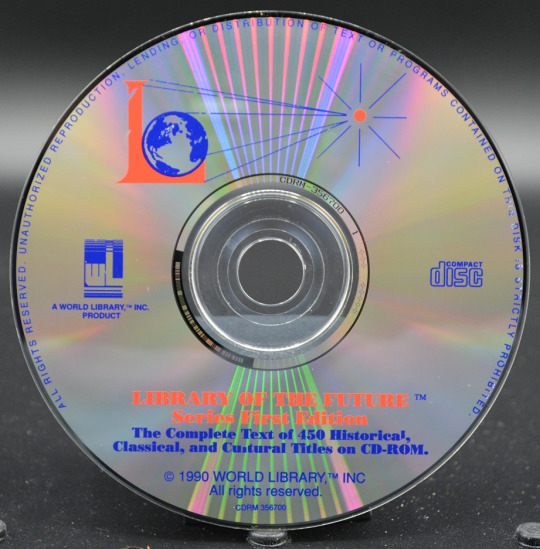

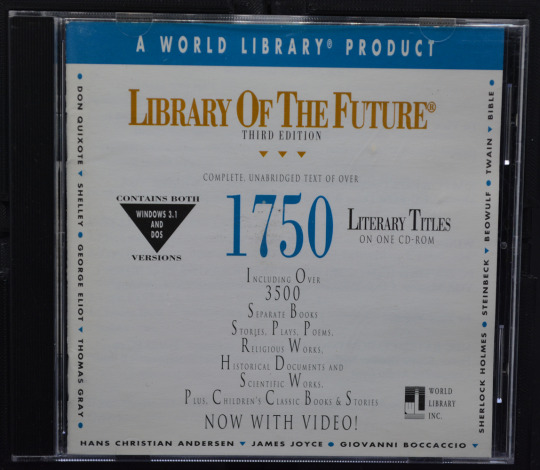
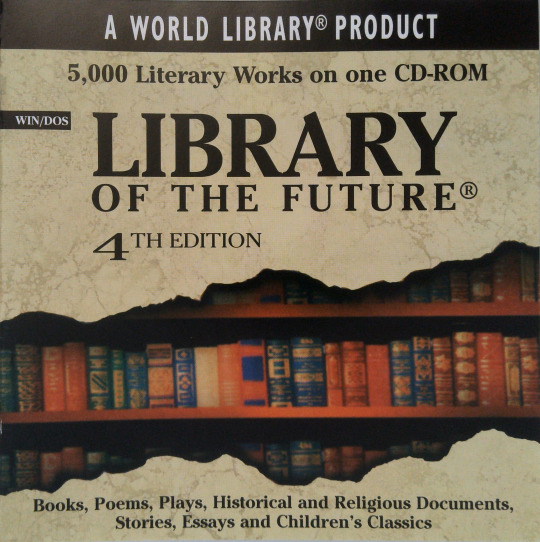
Included via that link are volumes 1 and 2 of the version released for the Sony Data Discman, an early eBook reader. Volume 1 includes a DOS program (for use in DOSBox) that can read it (it is listed as DEMO, but it accesses the whole text - rather, it's a demo of the Data Discman itself, as you can see below). To use it to read Volume 2, do this: use e.g. 7Zip to extract Volume 1's contents into a folder. Then do the same with Volume 2, and copy those contents into the Volume 1 folder, replacing their counterparts. You can find more Data Discman eBooks here.

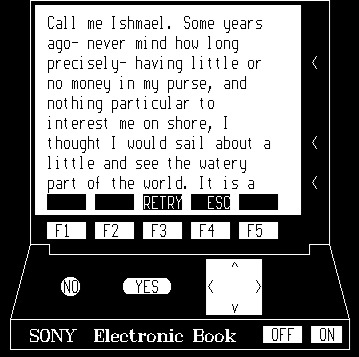
#internet archive#public domain#old software#computer history#computing history#retro computing#retro tech#1990#1991#1992#1993#1994#1996#1999#1990s#90s
15 notes
·
View notes
Text
Reading through some of the Appendix for the MfSJ in Hachette and my god, does it really emphasizes how knowingly sloppy and reckless the IA was. These are all statements of material fact by the publishers that the IA agreed were undisputed:
"Internet Archive does not always comply with its [own claimed] five year limitation. For example, two of the Works in Suit, All the Presidents’ Women and The Man Who Solved the Market, were published in 2019 and republished on the IA’s Website that same year." A-6066
"Mr. Kahle stated in a July 2019 blog post that Internet Archive 'has worked with 500 libraries over the last 15 years to digitize 3.5M books. But based on copyright concerns the selection has often been restricted to [public domain] books.'" A-6080
"Internet Archive’s former Director of Finance, Jacques Cressaty, also testified that, by 2016, 'our library partners ran out of books that were out of copyright, so pre-1923, and they’re reluctant to give us books that were in copyright.'" A-6080
"Mr. Freeland testified that Internet Archive 'was aware … that some partner libraries did not suppress circulation when they agreed to bec[o]me a partner library and put their books into controlled digital lending.'" A-6127
"Mr. Freeland testified that Internet Archive is also aware that even if a library puts a physical book into a non-circulating reference collection, it could be read in the library while the ebook equivalent is checked out." A-6127
Bonus: More cataloger nightmare fuel:
"The Internet Archive has stated that “Open Library’s book catalog has millions of books and thousands of data errors. Sometimes author names are misspelled, book covers are missing, or works and authors are duplicated or conflated.” A-6130
49 notes
·
View notes
Text
Free software recommendations for various things:
LibreOffice - A full home office suite comparable to Microsoft Office. Easy to use and you can choose the UI layout from several types; it can handle docx and other Microsoft Office document formats; it still does not include AI unless you specifically add that extension on purpose, so unlike other office suites it's not shoving AI down your throat.
Calibre - Ebook manager bundled with an ebook editor and ereader software. It can follow news feeds, downloading them into epub format. Convert ebooks from one format into (many) others. Run a server to make access your books from different computers/phones/tablets easier. And so much more... without even touching on the additional functionality that plugins can add. With plugins it can be used for DRM stripping (which can still remove DRM from even Kindle ebooks, if you have a kindle that you can download the ebook to and use to transfer to your computer). It can also handle downloading fanfics and their metadata using the FanFicFare plugin. (Which I've written tutorials about.) There are officially supported plugins (like FanFicFare) that are easy to install and unofficial plugins (like the DRM stripper) that take more work, so it's extremely customizable.
Syncthing - Want to host your own local file backup system? Have an old laptop that you can reformat with a linux distro? And maybe a spare hard drive? Perfect, you have what you need to set up a home file backup system. Reformat the computer with the new operating system, install syncthing on that computer and on the computer you want to back up files for and the two installations of the software can sync over your home network. Put it on your phone and back up your photos. The software is open source, encrypted, and you can turn it off so that your computer (or phone) is only running it on a trusted network. You control where the synced data lives, which computers on your network those synced folders are shared with (allowing for sharing between multiple computers) and even what type of file backups happen if data is, say, accidentally deleted. (File recovery!!!)
Plex or Emby - Both are free to install on any computer, point at any movie/tv show/audiobook/music files you've got sitting around, and bam you've got a home media streaming server. Both have paid tiers for more features (including tv tuner integration to act as a DVR), but what they can do for free is already impressive and well handled. Both have easy to use UI and it largely comes down to personal preference as to one is better than the other.
Notepad++ - A notepad type program that can also serve as a decent lightweight code editor. I use it for noodling around with code scripts and snippets, writing lists, and various other small tasks. It's not something I'd use for my professional code writing but it's great for just messing around with something on my own time.
14 notes
·
View notes
Text
Greely Expedition Publications and Media
See anything missing from the list below? Let me know!
Last Updated April 23, 2025
Narrative Histories:
Abandoned in the Arctic: Adolphus W. Greely and the Lady Franklin Bay Expedition, 1881-1884 Geoffrey E. Clark ISBN: 978-0974089522
Ghosts of Cape Sabine: The Harrowing True Story of the Greely Expedition Leonard F. Guttridge, 2000 Print ISBN: 0-425-17654-1
Labyrinth of Ice: The Triumphant and Tragic Greely Expedition Buddy Levy, 2019 Print ISBN: 978-1-250-78206-9
Abandoned: The Story of the Greely Arctic Expedition 1881-1884 Alden Todd, 1961 Print ISBN: 1-889963-29-1
Memoirs and Biographies:
The Outpost of the Lost David L. Brainard, 1929 Print ISBN: 978-1-5107-3521-7 (An abridged version of Brainard's diary from August 1883 to June 1884)
Three Years of Arctic Service Adolphus W. Greely, 1886 Bib ID: 2344946 Free Digital Copy: https://archive.org/details/threeyearsofarct02gree/page/n5/mode/2up
Farthest North; or the Life and Explorations of Lieutenant James Booth Lockwood, of the Greely Arctic Expedition Charles Lanman, 1885 Gutenberg EBook #54019 Free Digital Copy: https://www.gutenberg.org/files/54019/old/54019-h/54019-h.htm
Canada's Forgotten Arctic Hero: George Rice and the Lady Franklin Bay Expeditionm 1881-1884 Jim Lotz ISBN: 9781895415940
In the Lena Delta George W. Melville, 1885 Library of Congress #: 04016772 Free Digital Copy: https://play.google.com/store/books/details?id=O20SAAAAYAAJ&rdid=book-O20SAAAAYAAJ&rdot=1
Six Came Back David Brainard, 1940 No free, digital, or mass-print copies available (An abridged version of Brainard's diaries from 1881 to 1883. Very few copies available for less than $100 US)
Expedition Member Diaries:
Adolphus Greely (abridged and published as Three Years of Arctic Service, see above): https://www.pbs.org/wgbh/americanexperience/features/greely-journal/
David Brainard (abridged and published as The Outpost of the Lost, see above): https://collections.dartmouth.edu/teitexts/brainard-diary/diplomatic/brainard-2-diary-diplomatic.html#?start=0&length=12&view=list&col=brainard-diary&oc_0=main-title&od_0=a
George Rice: https://www.pbs.org/wgbh/americanexperience/features/greely-rice-journal/
Hampden Gardiner: a partial transcript and scans of Gardiner's journals was provided via US CECOM - hit me up to receive a copy
Documentaries and Video Essays:
Abandoned in the Arctic PBS, 2007 https://www.pbs.org/show/abandoned-arctic/
American Experience: The Greely Expedition PBS, 2011 https://www.pbs.org/wgbh/americanexperience/films/greely/ Currently available to rent/buy on Amazon Prime, but follow the link for image galleries and primary sources.
Tragedy on the Ice: U-M Astronomy and the Ill-Fated Greely Polar Expedition University of Michigan, 2023 Available on Youtube: https://www.youtube.com/watch?v=WqcmYerIKrA
Polar Survival: The Lady Franklin Bay Expedition of 1881-1884 The History Guy, 2021 Available on Youtube: https://www.youtube.com/watch?v=i4abprNgpnU
Fiction:
Starvation Shore Laura Waterman, 2019 ISBN: 9780299323400
The Greely Expedition's Fatal Quest for Farthest North Golriz Golkar, 2023 ISBN: 9781666390629
Websites:
Science and Survival at Fort Conger Virtual Museum Canada https://fortconger.org/index
Articles and Blog Posts:
David L. Brainard and the Greely Expedition of 1881-1884 Cecilia Brainard https://cbrainard.blogspot.com/2016/01/david-l-brainard-and-greely-expedition.html (A blog post about the author's spouse's ancestor: our own David Brainard! She's also recently published a book of short stories!)
In The Archives: Edward Israel's Polar Sky Laura Bien, 2011, The Ann Arbor Chronicle https://annarborchronicle.com/2011/01/21/in-the-archives-edward-israels-polar-sky/index.html
A Tale of Survival, Wrapped in a 19th-Century Reindeer-Skin Sleeping Bag Betsy Golden Kellem, 2020, Atlas Obscura https://www.atlasobscura.com/articles/caribou-sleeping-bag
Ghosts of Discovery Harbor: Digging for Data Andreas Muenchow https://icyseas.org/2016/02/11/ghosts-of-discovery-harbor-digging-for-data/#comments
An Arctic Execution: Private Charles B. Henry of the United States Lady Franklin Bay Expedition Glenn M. Stein https://glennmstein.com/wp-content/uploads/2024/04/An-Arctic-Execution-Charles-B.-Henry-LFBE-2011.pdf
The Arctic Exploits of Dr. Octave Pavy Douglas Wamsley https://www.researchgate.net/publication/276748841_The_Arctic_Exploits_of_Dr_Octave_Pavy
19 notes
·
View notes
Text
The Trump administration, working in coordination with Elon Musk’s so-called Department of Government Efficiency, has gutted a small federal agency that provides funding to libraries and museums nationwide. In communities across the US, the cuts threaten student field trips, classes for seniors, and access to popular digital services, such as the ebook app Libby.
On Monday, managers at the Institute of Museum and Library Services (IMLS) informed 77 employees—virtually the agency’s entire staff—that they were immediately being put on paid administrative leave, according to one of the workers, who sought anonymity out of fear of retaliation from Trump officials. Several other sources confirmed the move, which came after President Donald Trump appointed Keith Sonderling, the deputy secretary of labor, as the acting director of IMLS less than two weeks ago.
A representative for the American Federation of Government Employee Local 3403, a union that represents about 40 IMLS staffers, said Sonderling and a group of DOGE staffers met with IMLS leadership late last month. Afterwards, Sonderling sent an email to staff “emphasizing the importance of libraries and museums in cultivating the next generation’s perception of American exceptionalism and patriotism,” the union representative said in a statement to WIRED.
IMLS employees who showed up to work at the agency on Monday were asked to turn in their computers and lost access to their government email addresses before being ordered to head home for the day, the employee says. It’s unclear when, or if, staffers will ever return to work. “It’s heartbreaking on many levels,” the employee adds.
The White House and the Institute of Museum and Library Services did not immediately respond to requests for comment from WIRED.
The annual budget of IMLS amounts to less than $1 per person in the US. Overall, the agency awarded over $269.5 million to library and museum systems last year, according to its grants database. Much of that money is paid out as reimbursements over time, the current IMLS employee says, but now there is no one around to cut checks for funds that have already been allocated.
“The status of previously awarded grants is unclear. Without staff to administer the programs, it is likely that most grants will be terminated,” the American Federation of Government Employee Local 3403 union said in a statement.
About 65 percent of the funding had been allocated to different states, with each one scheduled to receive a minimum of roughly $1.2 million. Recipients can use the money for statewide initiatives or pass it on to local museum and library institutions for expenses such as staff training and back-office software. California and Texas have received the highest allocated funding, at about $12.5 million and $15.7 million, respectively, according to IMLS data. Individual libraries and museums also receive grants directly from IMLS for specific projects.
An art museum in Idaho expected to put $10,350 toward supporting student field trips, according to the IMLS grant database. A North Carolina museum was allotted $23,500 for weaving and fiber art workshops for seniors. And an indigenous community in California expected to put $10,000 toward purchasing books and electronic resources.
In past years, other Native American tribes have received IMLS grants to purchase access to apps such as Hoopla and Libby, which provide free ebooks and audiobooks to library patrons. Some funding from the IMLS also goes to academic projects, such as using virtual reality to preserve Native American cultural archives or studying how AI chatbots could improve access to university research.
Steve Potash, founder and CEO of OverDrive, which develops Libby, says the company has been lobbying Congress and state legislatures for library funding. “What we are consistently hearing is that there is no data or evidence suggesting that federal funds allocated through the IMLS are being misused,” Potash tells WIRED. “In fact, these funds are essential for delivering vital services, often to the most underserved and vulnerable populations.”
Anthony Chow, director of the School of Information at San José State University in California and president-elect of the state library association, tells WIRED that Monday was the deadline to submit receipts for several Native American libraries he says he’d been supporting in their purchase of nearly 54,000 children’s books using IMLS funds. Five tribes, according to Chow, could lose out on a total of about $189,000 in reimbursements. “There is no contingency,” Chow says. “I don’t think any one of us ever thought we would get to this point.”
Managers at IMLS informed their teams on Monday that the work stoppage was in response to a recent executive order issued by Trump that called for reducing the operations of the agency to the bare minimum required by law.
Trump made a number of other unsuccessful attempts to defund the IMLS during his first term. The White House described its latest effort as a necessary part of “eliminating waste and reducing government overreach.” But the president himself has said little about what specifically concerns him about funding libraries; a separate order he signed recently described federally supported Smithsonian museums as peddling “divisive narratives that distort our shared history.”
US libraries and museums receive support from many sources, including public donations and funding from other federal agencies. But IMLS is “the single largest source of critical federal funding for libraries,” according to the Chief Officers of State Library Agencies advocacy group. Libraries and museums in rural areas are particularly reliant on federal funding, according to some library employees and experts.
Systems in big metros such as Los Angeles County and New York City libraries receive only a small fraction of their budget from the IMLS, according to recent internal memos seen by WIRED, which were issued in response to Trump’s March 14 executive order. "For us, it was more a source of money to innovate with or try out new programs,” says a current employee at the New York Public Library, who asked to remain anonymous because they aren’t authorized to speak to the press.
But the loss of IMLS funds could still have consequences in big cities. A major public library system in California is assembling an internal task force to advocate on behalf of the library system with outside donors, according to a current employee who wasn’t authorized to speak about the effort publicly. They say philanthropic organizations that support their library system are already beginning to spend more conservatively, anticipating they may need to fill funding gaps at libraries in areas more dependent on federal dollars.
Some IMLS programs also require states to provide matching funding, and legislatures may be disincentivized to offer support if the federal money disappears, further hampering library and museum budgets, the IMLS employee says.
The IMLS was created by a 1996 law passed by Congress and has historically received bipartisan support. But some conservative groups and politicians have expressed concern that libraries provide public access to content they view as inappropriate, including pornography and books on topics such as transgender people and racial minorities. In February, following a Trump order, schools for kids on overseas military bases restricted access to books “potentially related to gender ideology or discriminatory equity ideology topics.”
Last week, a bipartisan group of five US senators led by Jack Reed of Rhode Island urged the Trump administration to follow through on the IMLS grants that Congress had authorized for this year. "We write to remind the administration of its obligation to faithfully execute the provisions of the law," the senators wrote.
Ultimately, the fate of the IMLS could be decided in a showdown between Trump officials, Congress, and the federal courts. With immediate resolution unlikely, experts say museums and libraries unable to make up for lost reimbursements will likely have to scale back services.
11 notes
·
View notes
Text
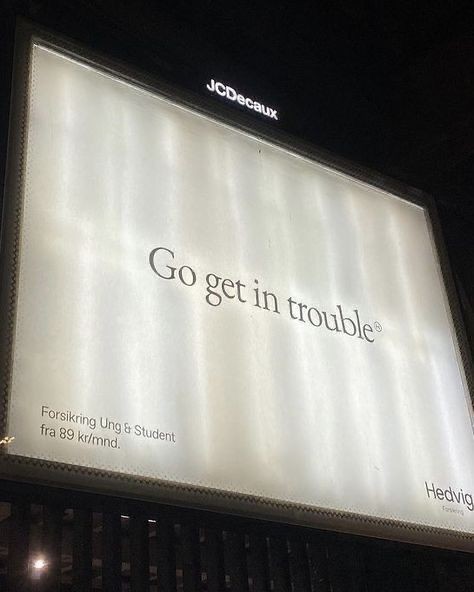
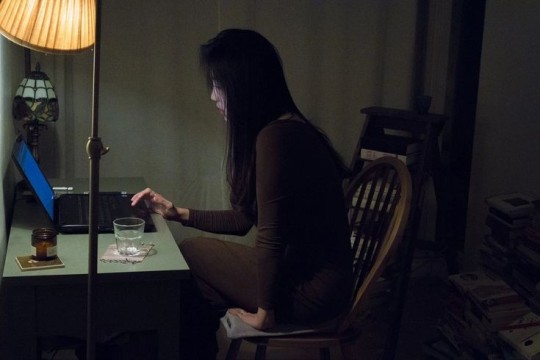
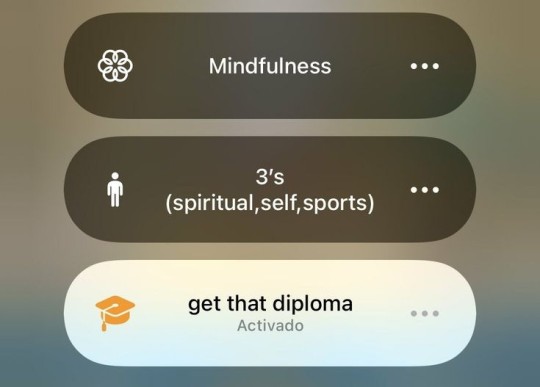
Resources and study tips to get you in cyber forensics
Master post • Part1 • part2
let's get you prepped to be a cyber sleuth without spending any cash. Here’s the ultimate tips and resources.
Ps: you can't become one while doing these pointers but you can experience the vibe so you can finally find your career interest
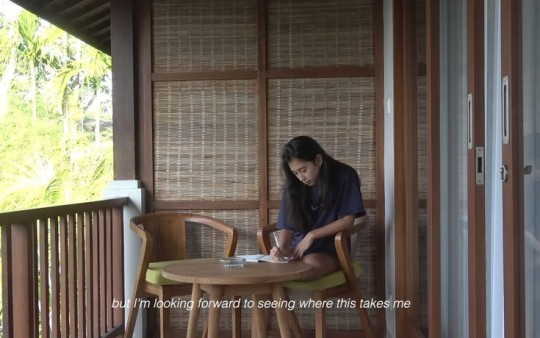
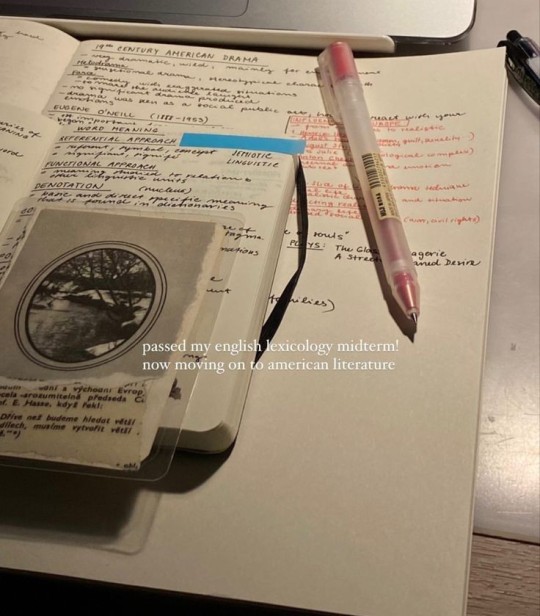
### 1. **Digital Scavenger Hunts**
- **CTF Challenges (Capture The Flag)**: Dive into platforms like [CTFtime](https://ctftime.org/) where you can participate in cyber security challenges. It's like playing *Among Us* but with hackers—find the imposter in the code!
- **Hunt A Killer (Digitally)**: Create your own digital crime scenes. Ask friends to send you files (like images, PDFs) with hidden clues. Your job? Find the Easter eggs and solve the case.
### 2. **YouTube University**
- **Cyber Sleuth Tutorials**: Channels like *HackerSploit* and *The Cyber Mentor* have playlists covering digital forensics, cybersecurity, and more. Binge-watch them like your fave Netflix series, but here you're learning skills to catch bad guys.
- **Live Streams & Q&A**: Jump into live streams on platforms like Twitch where cybersecurity experts solve cases in real-time. Ask questions, get answers, and interact with the pros.
### 3. **Public Libraries & eBook Treasure Hunts**
- **Library eBooks**: Most libraries have eBooks or online resources on digital forensics. Check out titles like *"Hacking Exposed"* or *"Digital Forensics for Dummies"*. You might have to dig through the catalog, but think of it as your first case.
- **LinkedIn Learning via Library**: Some libraries offer free access to LinkedIn Learning. If you can snag that, you've got a goldmine of courses on cybersecurity and forensics.
### 4. **Virtual Study Groups**
- **Discord Servers**: Join cybersecurity and hacking communities on Discord. They often have study groups, challenges, and mentors ready to help out. It's like joining a digital Hogwarts for hackers.
- **Reddit Threads**: Subreddits like r/cybersecurity and r/hacking are packed with resources, advice, and study buddies. Post your questions, and you’ll get a whole thread of answers.
### 5. **DIY Labs at Home**
- **Build Your Own Lab**: Got an old PC or laptop? Turn it into a practice lab. Install virtual machines (VMware, VirtualBox) and play around with different operating systems and security tools. It’s like Minecraft but for hacking.
- **Log Your Own Activity**: Turn on logging on your own devices and then try to trace your own steps later. You’re basically spying on yourself—no NSA required.
### 6. **Community College & University Open Courses**
- **Free Audit Courses**: Many universities offer free auditing of cybersecurity courses through platforms like Coursera, edX, and even YouTube. No grades, no stress, just pure learning.
- **MOOCs**: Massive Open Online Courses often have free tiers. Try courses like "Introduction to Cyber Security" on platforms like FutureLearn or edX.
### 7. **Scour GitHub**
- **Open-Source Tools**: GitHub is full of open-source forensic tools and scripts. Clone some repositories and start tinkering with them. You’re basically getting your hands on the tools real investigators use.
- **Follow the Code**: Find projects related to digital forensics, follow the code, and see how they work. Contribute if you can—bonus points for boosting your resume.
### 8. **Local Meetups & Online Conferences**
- **Free Virtual Conferences**: Many cybersecurity conferences are virtual and some offer free access. DEF CON has a lot of free content, and you can find tons of talks on YouTube.
- **Hackathons**: Look for free entry hackathons—often universities or tech companies sponsor them. Compete, learn, and maybe even win some gear.
### 9. **DIY Challenges**
- **Create Your Own Scenarios**: Get a friend to simulate a hack or data breach. You try to solve it using whatever tools and resources you have. It's like escape rooms, but digital.
- **Pen & Paper Simulation**: Before diving into digital, try solving forensic puzzles on paper. Map out scenarios and solutions to get your brain wired like a detective.
### 10. **Stay Updated**
- **Podcasts & Blogs**: Tune into cybersecurity podcasts like *Darknet Diaries* or follow blogs like *Krebs on Security*. It’s like getting the tea on what’s happening in the cyber world.
### 11. **Free Software & Tools**
- **Autopsy**: Free digital forensics software that helps you analyze hard drives and mobile devices. Think of it as your magnifying glass for digital clues.
- **Wireshark**: A free tool to see what's happening on your network. Catch all the data packets like you're a digital fisherman.
### 12. **Online Forensics Communities**
- **Free Webinars & Workshops**: Join communities like the *SANS Institute* for free webinars. It's like attending a masterclass but from the comfort of your gaming chair.
- **LinkedIn Groups**: Join groups like *Digital Forensics & Incident Response (DFIR)*. Network with pros, get job tips, and stay in the loop with the latest trends.
### 13. **Practice Cases & Mock Trials**
- **Set Up Mock Trials**: Role-play with friends where one is the hacker, another the victim, and you’re the investigator. Recreate cases from famous cybercrimes to see how you'd solve them.
- **Case Studies**: Research and recreate famous digital forensic cases. What steps did the investigators take? How would you handle it differently?


There you have it—your roadmap to becoming a cyber sleuth without dropping a dime. You don't have time find your interest after paying pennies to different ppl and colleges. You can explore multiple things from comfort of your home only if you want to.

#light academia#study blog#academic validation#academic weapon#student life#study motivation#study with me#study#studyblr#studyblr community#masterpostjam#codeblr
30 notes
·
View notes
Note
in a recent post you said in the tag you were a school librarian for small children , and i have some questions about the job if you are willing to answer
how hard is it , and by that i mean is it hectic , or you have free time ?
what are the best and worst thing about your job , like just in general , the thing that when it come up , make you go yayayaya i like this vs gevdvew why cant i do it tommorow
Hello! Thank you for the ask! Be warned, I love my job A LOT so I'm going to ramble about it.
I will say, first, that I did not go to school to become a librarian. I kind of fell into the job sideways. I am trained as a teacher, and so slipped into the teacher-librarian role when it opened up at my school. This means that a lot of the stuff the other librarians are responsible for (cataloguing and data management and other things involving math) I don't have to do. My responsibilities are focused around running library classes with the primary grades (helping them get new books, reading them stories, and running small workshops focused around things like digital literacy), finding resources for homeroom/specialist teachers to support the curriculum in the classroom, and managing the library space (shelving books, ordering new books, getting authors to visit, promoting certain books during events/holidays, etc).
It can be hectic, because there is always someone dropping into the library needing a book, or help with their ebook account, or a question about a graphic novel, or wanting to hide from recess because its too cold outside. And that's inbetween when I have scheduled classes coming in for their library time (and I have between three to five of those a day). There's always something that needs to be done (such as the shelving. Oh god, the shelving), so while my schedule might say I have some free time, I'm never actually just sitting and reading at my desk. But its an active, hands-on sort of job where I'm busy doing things and not just answering emails or staring at a computer, and I live for the productive chaos working with small children brings. Never a dull moment, that's for sure.
Best part of the job is definitely my students. I love how this job lets me interact and teach and get to know them really well (kids will tell a trusted librarian everything) but I don't need to worry about meeting parents or marking homework or writing report cards. And I get all sorts of interesting requests for books too, from "I need a book with lots of murder in it" (says a child age eight) to a student who asked me for a book that had "a dog main character, magic but set in the real world and was a little sad." (Dogsbody, by the way. The book that has all of these things is Dogsbody by Diana Wynne Jones and I was SO proud of myself for knowing that one). I love seeing them fall in love with a series or an author, or to listen to them info-dump all about their special interest and watch them walk out with a stack of new books on turtles or baking or Egyptian mythology. And I love reading picture books out loud to the tiny ones. Not to brag, but I am very skilled at making silly voices.
Worst part of the job is - and this is going to sound very silly - the shelving. Look, I get all the books nice and organized on the shelves, and then by the end of the day they are all OFF the shelves (or put back on in the completely wrong order by a small child trying to be helpful) and I have to do it all over again. Fiction and graphic novels are okay, but non-fiction is so specific with the Dewey system that it just drives me insane. And then I'll find all sorts of oddities while shelving, like the time someone put Worm books in the Cooking section and Cooking books in the Worm section, or the time I found a sock being used as a bookmark. Every time I look at the carts filled with "to be shelved" books I think "maybe I can deal with this tomorrow instead" (which leads to me having to do EVEN MORE shelving the next day, so not the best plan on my part). Like I said, its a silly thing because I want the kids to take the books off the shelves and read them, I just wish it wasn't so much work to put them all back on.
I hope that answers your questions!
14 notes
·
View notes
Text
Adam Chace picked a pretty good time to create a data archiving product for turbulent times. I first saw an ad for PrepperDisk on Reddit soon after the election of Donald Trump: “Take lifesaving websites into any emergency,” and “Be SHTF (Shit Hits the Fan) Proof,” the ads read.
PrepperDisk is a mini internet box that comes preloaded with offline backups of Wikipedia, street maps, survivalist information, 90,000 WikiHow guides, iFixit repair guides, government website backups (including FEMA guides and National Institutes of Health backups), TED Talks about farming and survivalism, 60,000 ebooks and various other content. It’s part external hard drive, part local hotspot antenna—the box runs on a Raspberry Pi that allows up to 20 devices to connect to it over wifi or wired connections, and can store and run additional content that users store on it. It doesn't store a lot of content (either 256GB or 512GB), but what makes it different from buying any external hard drive is that it comes preloaded with content for the apocalypse.
I was interested in PrepperDisk because I care about data hoarding and archiving more broadly, but I wanted to talk to Chace after it became clear that a lot of his sales seemed to be a direct result of Trump being elected president.
“Sales increased dramatically in the early part of the new administration as economic uncertainty and even uncertainty about government data prevailed,” Chace told me. “Elon Musk is pulling data off of federal websites, and we want to make sure people realize is like, ‘Hey, this might have a use case even when the internet itself remains up, but there might be political reasons why that data isn’t available.”
“The National Institutes of Health, we have their entire website on our device, and some of their information has been pulled off the internet,” he added. "We have gotten a lot of questions about the content that’s getting deleted. The National Library of Medicine is one we get asked about a lot as it has had content deleted. We’ve had customer ask about whether the Prepper Disk copy of Wikipedia would continue to have entries that ‘might get deleted by the government.’ Yes. Our copy of FEMA’s emergency management website, Ready.gov, has gotten a lot of questions as that website was part of the DOGE sweep. Amusingly I had a customer also ask what the Gulf of Mexico was called on our maps [it’s still the Gulf of Mexico]. It is clear that folks are looking at the overall permanency of data on the Internet and our product as a way to control some of that.”
8 notes
·
View notes